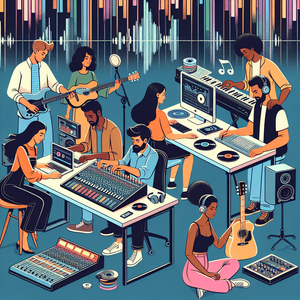
Navigating the World of Freelance Music Production: Essential Roles, Skills, and Opportunities
Starting a career in freelance music production can be both thrilling and daunting. This dynamic field blends creativity, technical expertise, and entrepreneurial spirit. While formal education can undoubtedly enhance one’s credentials, many successful producers carve their paths through self-education and a robust portfolio. A few key insights from industry professionals emphasize the significance of networking, showcasing one’s work, and staying adaptable to the ever-changing music landscape. This variety of pathways illustrates the wealth of opportunities within music production, appealing to anyone passionate about music.
Job Summaries:
Freelance Music Producer:
- Freelance music producers are at the forefront of creating tracks across diverse genres.
- They oversee the entire production process, from songwriting and arranging to recording and mixing.
- A solid understanding of music theory, proficiency in digital audio workstations (DAWs), and strong communication skills are vital for effective collaboration with clients.
- While formal training can lend credibility, many successful producers thrive on self-directed learning and practical experience.
- Ultimately, their role is crucial in transforming artists' visions into polished soundscapes.
Music Production Assistant:
- Serving as a support pillar in studio settings
- Help producers and engineers with various tasks
- Including equipment setup and session preparation
- A background in music can be beneficial
- Organizational skills and a willingness to learn take precedence
- Entry-level role provides essential hands-on experience
- Offers insight into the intricate processes of music production
- An invaluable stepping stone for future producers.
Audio Engineer:
- Audio engineers ensure high-quality recordings, mixing, and mastering of music tracks.
- They work closely with producers and artists, applying technical skills and knowledge of audio equipment.
- While a degree in audio engineering adds value, hands-on experience and familiarity with DAWs are equally important.
- Their expertise significantly shapes the final sound of a production, making them indispensable in the music creation journey.
Beat Maker:
- Beat makers focus on crafting instrumental tracks, particularly in genres like hip-hop and EDM.
- Using software and hardware, they design rhythms and melodies.
- This requires a solid understanding of music theory and an adventurous approach to sound experimentation.
- Many beat makers are self-taught.
- They develop a portfolio that showcases their unique style to attract clients and collaborations.
Music Composer:
- Music composers create original scores for various media, including films and video games.
- A strong grasp of music theory and composition techniques is essential.
- Proficiency in notation software is important.
- Composers enhance the storytelling aspects of visual media.
- Their contributions are crucial to the overall production experience.
Sound Designer:
- Sound designers develop and manipulate audio elements.
- They craft soundscapes for films, games, and live performances.
- Their work requires creativity coupled with technical proficiency in audio editing tools.
- A background in audio engineering or music production is beneficial.
- A strong portfolio showcasing their projects is essential for attracting clients.
Music Supervisor:
- Music supervisors select and license music for various media.
- They require a solid understanding of music licensing laws.
- A broad knowledge of musical genres is essential.
- Excellent communication and negotiation skills are vital.
- They serve as liaisons between artists and production companies.
- Their role is crucial in curating music that enhances the narrative of visual stories.
Music Marketing Specialist:
- Music marketing specialists promote artists and their music through diverse channels, including social media and live events.
- They blend creativity with analytical skills to develop engaging marketing strategies.
- While a background in marketing can be beneficial, a deep understanding of the music industry is essential for success in connecting artists with their audiences.
Live Sound Technician:
- Live sound technicians manage audio for live events, ensuring optimal sound quality.
- Their responsibilities include equipment setup and troubleshooting during performances.
- A background in audio engineering or technical theater is often necessary, along with hands-on experience in live sound environments.
- Their work directly impacts the audience's enjoyment, underscoring the importance of this role.
Music Business Manager:
- Music business managers oversee the financial and contractual aspects of an artist's career.
- Strong organizational and communication skills are essential.
- A thorough understanding of the music industry is important.
- While a degree in business can be helpful, practical experience is crucial for successfully navigating the complexities of managing an artist's career.
These roles collectively illustrate the diverse opportunities within music production, each contributing uniquely to the creation and promotion of music. For those looking to enter this vibrant industry, there are numerous pathways to a fulfilling career.
Explore More Jobs
